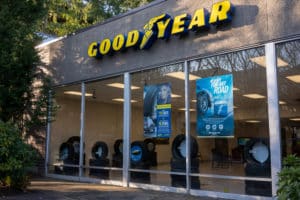Conflicting Evidence Means that Goodyear Can’t Have Lung Cancer Lawsuit Dismissed
For years, American manufacturers ignored warnings that asbestos in their products could lead to users and employees being sickened by mesothelioma, lung cancer, and other serious illnesses. The practice didn’t stop until the public became aware of the danger, and companies began facing lawsuits seeking compensation for the damage that they’d caused. Now those same companies try to use the legal system to evade responsibility. Fortunately, the American legal system has rules designed to level the playing field.

Asbestos in Goodyear Gaskets Frequently Blamed for Mesothelioma and Lung Cancer
Goodyear Tire & Rubber Company is just one of many companies frequently named as a defendant in mesothelioma and lung cancer lawsuits, as the company’s asbestos-containing gaskets were frequently used by people who worked in automotive repair. In a recently heard case, Robert O. Waldon’s survivors filed a personal injury lawsuit against the company.
In response to the lung cancer lawsuit, Goodyear filed a legal petition asking for the case to be dismissed rather than going to trial. This type of legal filing is called a motion for summary judgment: it argues that the plaintiff’s claim does not contain enough evidence to warrant the case being heard by a jury.
Judge Decides Against Asbestos Company’s Argument in Lung Cancer Lawsuit
In reviewing the arguments from both the lung cancer victim’s family and the company, Justice Adam Silvera of the Supreme Court of New York County reminded both sides of the high level of proof that a defendant must present to have a plaintiff’s case dismissed. He said that in mesothelioma and lung cancer cases in general, and this case in particular, Goodyear could only have the case dismissed if it could establish that its products could not possibly have caused Mr. Waldon’s lung cancer.
The judge then turned to the evidence that each side had presented. He noted that the company had provided expert reports from an industrial hygienist and a physician and that Mr. Waldon’s family had provided testimony in conflict with the company’s, including evidence from the company’s manufacturing history that indicated that they had used asbestos-containing sheet gasket material in its fabrication process.
As a result of the direct conflict and Goodyear’s failure to provide an estimate of how much asbestos Mr. Waldon would have been exposed to during his career, he said the company had failed to meet the burden required for summary judgment, and the case must be decided by a jury.
The decision reinforces that when expert opinions conflict in asbestos-related lung cancer and mesothelioma cases, credibility determinations belong to juries, not judges. By faulting Goodyear for failing to quantify or negate potential asbestos exposure from its gasket materials, the court clarified that defendants must do more than present generalized expert opinions to obtain dismissal. For plaintiffs, the ruling confirms that historical manufacturing evidence combined with work-history testimony can defeat summary judgment. For defendants, it signals that unresolved exposure questions and competing expert analyses will keep cases alive and headed to trial.
Legal Disclaimer
The information provided is for educational and informational purposes only. The information on this website is not intended as legal advice and should not be used as a substitute for consulting a licensed attorney. Legal outcomes and laws can vary by jurisdiction, and only a qualified lawyer can provide guidance tailored to your situation.


FREE Financial Compensation Packet
- Info on law firms that will recover your HIGHEST COMPENSATION
- Learn how to get paid in 90 days
- File for your share of $30 billion in trust funds

